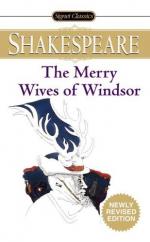|
This section contains 12,361 words (approx. 42 pages at 300 words per page) |

|
SOURCE: Collington, Philip D. “‘I Would Thy Husband Were Dead’: The Merry Wives of Windsor as Mock Domestic Tragedy.” English Literary Renaissance 30, no. 2 (spring 2000): 184-212.
In the following essay, Collington argues that The Merry Wives of Windsor is a parody of the genre of domestic tragedy.
Fond woman which would'st have thy husband die, And yet complain'st of his great jealousie; If swolne with poyson, hee lay in 'his last bed, His body with a sere-barke covered, .....Thou would'st not weepe, but jolly, 'and frolicke bee, As a slave, which to morrow should be free
When John Donne wrote these lines in his “Elegie: Jealosie” in the mid-1590s, he was invoking a crime that loomed large in the popular imagination of his time.1 Petty treason—the murder of a husband by his wife, or of a household master by a servant or apprentice—was never more topical...
|
This section contains 12,361 words (approx. 42 pages at 300 words per page) |

|


